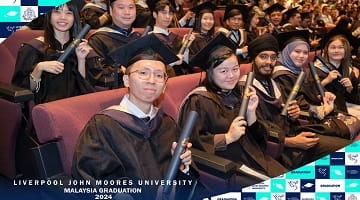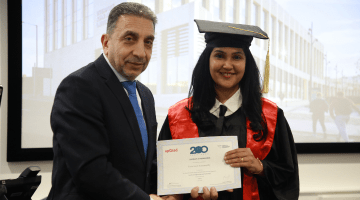Why study this course with LJMU?
- Programme follows the Chartered Manager Degree Apprenticeship (CMDA) Standard
- A distinctive management programme aimed at developing confident, competent forward-thinking managers
- Uses innovative teaching and learning methods, both in the Liverpool Business School and in the apprentice's place of work
- Taught in block release format, encompassing on average 5 days of taught delivery, three times a semester
- The Degree Apprenticeship partnership programme brings together the learner, the employer and the peer group of fellow learners into a wider community from within the Liverpool Business School and participating organisations
- Shortlisted for the Times Higher Education Awards 2024 Business School of the Year
About your course
The BA (Hons) Business and Management Practice Chartered Manager Degree Apprenticeship at Liverpool John Moores University has been designed in conjunction with the Chartered Management Institute (CMI), to meet employer demands for business-ready graduates and provides a valuable route for upskilling experienced managers already in the workplace.
Rooted in workplace, this programme of learning provides a distinctive degree-level manager development qualification, which balances intellectual challenges with business and workplace practice across all areas of management, leadership and career development.
The CMDA is part of a wider Government initiative to support and enable the development of skills in the workplace through apprenticeships. At the Liverpool Business School we see manager and leader development as a lynchpin for the wider development of skills and talent needed to deliver improved performance in organisations.
While the apprenticeship initiative has the potential to act as a springboard for skills development, crucially it is managers and leaders who need to identify and develop talent, and it is managers that can help organisations make the most of their emerging talent. How skills are brought together in an organisation matters, and managers play a pivotal role in making this happen.
Learn more about Degree Apprenticeships.
The aim of the CMDA is to prepare people for management roles and to develop those already in such roles to help them be more effective in the workplace. The programme focuses on the following four key themes, each representing a year of part-time study, culminating in an in-company project, providing a marriage of learning development with practice:
- Self-development and performance through others: good management development begins with the individual, their needs and how best to help the person develop as a manager and leader within their organisational context. However, to be effective as a manager, others with whom they work need to perform effectively. This programme begins where it is possible to make an impact quickly: with the individual learner's performance and with whom they work
- Organisational effectiveness: organising to deliver value for customers combines business finances to inform management decision making and the management of key processes and projects. Good management is about delivering value for customers, and that means understanding how to get the best out of the core operations in the organisation.
- Seeing the bigger picture: connecting customers to strategy and the leadership to energise and bring strategy to life. Such leadership creates advantage and brings together the outwards focus of customer and markets with the strengths and capabilities of the organisation
- Innovation, change and sustainability: This final theme opens up the broader manager roles of continually improving and innovating, with being a good corporate citizen, enhancing the wider society of which they are a part, in ways that contribute to the long-term purpose of the organisation.
Course modules
What you will study on this degree
Further guidance on modules
Modules are designated core or optional in accordance with professional body requirements, as applicable, and LJMU’s Academic Framework Regulations. Whilst you are required to study core modules, optional modules provide you with an element of choice. Their availability may vary and will be subject to meeting minimum student numbers.
Where changes to modules are necessary these will be communicated as appropriate.
Core modules
People management in practice
20 credits
20 credits
This module aims to develop apprentices understanding of the role of human resources management and line managers in managing and developing people. Apprentices will be introduced to a range of theories and practice of human resource management, to focus on how to recruit, manage and develop people using inclusive talent management approaches. To be able to effectively manage performance and use HR systems and processes to ensure legal requirements, health and safety and well-being are met.
Team performance project
20 credits
20 credits
This module aims for apprentices to apply knowledge skills and behaviours to practice in a work-based project using the learning from the modules during the year on the theme of developing self and delivering performance through others.
Personal and management development
20 credits
20 credits
This module aims to help the students begin their studies by identifying their own personal and professional development needs by self-review and an assessment of their business/organisation context. The module will enable apprentices to view continuing professional development as key to maximising their performance in the role and workplace and will provide them with a sound understanding of related skills and theory.
Managing and leading others
20 credits
20 credits
This module introduces apprentices to management and leadership theories and concepts to develop their appreciation of the different roles managers perform. Apprentices will explore how management and leadership impacts team performance and reflect on their own practice in these areas.
The coaching manager
10 credits
10 credits
This module is focused on how you can use coaching skills to get the best from the people you manage and work with.
Business operations and process management
20 credits
20 credits
This module aims to help apprentices understand the importance of analysing operational processes to drive organisational productivity. Utilising the latest process and project management tools and techniques, apprentices will be able to effectively lead and implement organisational improvement projects.
Managing projects and risk
10 credits
10 credits
This module equips apprentices with the knowledge and skills needed for effective project planning, management, and risk analysis. It covers project lifecycle understanding, risk management, and health and safety considerations. Skills include developing operational plans, resource management, progress monitoring, and risk mitigation, along with the use of project management tools.
Core modules
Customers and markets
20 credits
20 credits
This module aims to develop apprentices understanding of the how marketing processes and strategies support organisational objectives, customer engagement and value creation.
Responsible management and effective communications
20 credits
20 credits
This module aims to develop apprentices ability to effectively communicate with an organisations stakeholders using marketing and communications theories and strategies.
Finance for managers
20 credits
20 credits
This module aims to develop apprentices understanding of finance in an organisational context. Apprentices will gain knowledge and skills in the areas of financial management and accounting, to develop their understanding of how financial analysis supports governance and decision making.
Informed decision making
10 credits
10 credits
This module explores decision making and problem-solving models and theories to enable effective decisions to be made within an organisational context.
Business case project
20 credits
20 credits
In this module, apprentices will apply knowledge and skills to develop a business case to address an agreed issue or opportunity in the workplace.
Exploring the global context
10 credits
10 credits
This module allows apprentices to explore the impact of the external environment on organisations. Apprentices will apply theories, concepts and frameworks to assess how the eco-system their organisation operates in creates opportunities and threats.
Developing and leading strategy
20 credits
20 credits
In this module apprentices will develop their understanding of organisational strategy and the strategic planning process. Strategic value and vision will be explored to contribute to apprentices understanding of how strategic decisions are made in the context of the external environment and internal capabilities.
Core modules
Creating advantage project
20 credits
20 credits
Synthesise and apply relevant theory and concepts to develop strategies to enhance the value created by an organisation.
Digital business and new technologies
20 credits
20 credits
This module aims to develop apprentices understanding of how digital technologies impact organisations. Digital business concepts will be explored to provide apprentices with the knowledge and skills required to assess an organisations digital position and identify opportunities to exploit new technologies.
Leading innovation
20 credits
20 credits
This module aims to develop apprentices understanding of how innovation functions in organisations. Innovation drivers, strategy, process and culture will be explored to provide apprentices with the knowledge and skills required to act innovatively and support innovation in the workplace.
Managing and leading change
20 credits
20 credits
This module aims to introduce apprentices to the nature of organisational change and the strategies and techniques used to manage the change process. It will view the impact of change on individuals, teams and organisations.
Developing collaborative relationships
10 credits
10 credits
This module aims to develop apprentices ability to effectively communicate with an organisations stakeholders using marketing and communications theories and strategies.
Integrative project
30 credits
30 credits
This module aims to draw together learning from across the programme to enable apprentices to develop a work-based project focused on delivering significant value or improvement to the organisation.
Professional accreditation/links
The Liverpool Business School CMDA is designed in conjunction with the Chartered Management Institute (CMI), to meet employer demands for business-ready graduates and provides a valuable route for upskilling experienced managers already in the workplace, who may lack formal management education. It offers a world-class business and management degree, work-based learning, and ongoing professional development through to chartered status (Chartered Management Institute).
Your Learning Experience
Excellent facilities and learning resources
We adopt an active blended learning approach, meaning you will experience a combination of face-to-face and online learning during your time at LJMU. This enables you to experience a rich and diverse learning experience and engage fully with your studies. Our approach ensures that you can easily access support from your personal tutor, either by meeting them on-campus or via a video call to suit your needs.
The delivery model for the CMDA is a block release format. Encompassing on average 5 days of taught delivery, three times a semester.
To support their development, learners will also be assigned a dedicated mentor from a pool of specialist coaches within the School of Leadership and Personal Development. Twice a year, mentors will visit learners in their workplace to meet with them and their supervisors. These meetings provide the opportunity to embed and extend learning in the organisational environment and maintain a focus on the degree apprenticeship standards learners are working towards.
Work-related Learning
The CMDA is rooted in workplace, with students spending the majority of their time with the employer and 3-5 days of taught delivery in Liverpool Business School, three times per semester. The programme provides a distinctive degree-level management development qualification, which balances intellectual challenges with business and workplace practice across all areas of management, leadership and career development. The programme adopts effective management development practices to ensure that learning results in improved workplace performance.
Work-based learning techniques will include:
- Recognising the workplace as an important place to learn where students can apply ideas in the workplace, improve their skills through a range of activities and then reflect on their practice
- Technology enhanced learning enables rich interactions to take place and supports the use of innovative learning and development methods
- 'Flipped learning reverses the conventional process of teaching by providing the content prior to the teaching and learning session using Canvas, LJMU's virtual learning environment - the focus of the workshop becomes about active learning and application of theory to practice
- Coaching and mentoring enables the individual learner to tailor the programme to meet your needs. It also provides the opportunity for the organisation to propose business critical skills and values which can become a part of the development activities Action learning will be used to support personal development where issues and challenges from the workplace can be discussed. This approach to management learning provides a forum to bring ideas, thoughts and issues and allows a collaborative learning process to develop ideas for action
Dedicated personal tutor, plus study skills support
The CMDA begins with a diagnostic discussion with the employee and the employer, which will enable the individual and organisations needs to be incorporated into the programme. Employers may want specific competencies and values emphasised, or a focus on particular aspects of the business. This can all be done through personal development planning, tailored assignments, and most importantly through the projects. Each learner will be assigned a personal tutor who will provide academic support and, when necessary, signpost students to the appropriate university support services.
Assessment varies depending on the modules you choose, but will usually include a combination of exams and coursework.
You will be assessed using a variety of methods including: Portfolio; Business Reports; Presentations; Reflective diaries; Personal development reports; Project management plans, and Work-based projects.
Where you will study
What you can expect from your School
The School is based in the Redmonds Building, in the heart of the bustling Mount Pleasant Campus and Liverpool 's growing Knowledge Quarter. The building is home to high quality lecture theatres and seminar rooms, social spaces, a café and a roof terrace with far reaching views of the cityscape and welsh hills. It is only a short walk from LJMU 's Aldham Robarts Library, which contains all the resources you will require for your studies, and is open seven days a week.
Course tutors

Dr Claire Pekcan
- Programme Manager
-
 Programme Leader
Programme Leader -

-
 Lecturer/Senior Lecturer
Lecturer/Senior Lecturer -
 Programme Leader
Programme Leader -
 Lecturer/Senior Lecturer
Lecturer/Senior Lecturer -
 Lecturer/Senior Lecturer
Lecturer/Senior Lecturer


Our philosophy is to build learning programmes that are inherently personalised to individuals and customised for businesses.
Career paths
The aim of the CMDA is to prepare you for management roles and to develop those already in such roles to help them be more effective in the workplace.
You will apply for a CMDA through a partner employer organisation, and depending on the arrangement made between the employer and the Liverpool Business School, you will have a variety of opportunities within the employer organisation to develop your skills and career opportunities.
The CMDA will prepare you for a successful career in management by ensuring you achieve the following outcomes:
- understanding and appreciation of the requirements of each function in an organisation; including business finance,marketing and sales, and leading people, organisational behaviour, and supply chain management
- the ability to utilise tools and techniques, relating to the business functions required to sustain the business in a rapidly changing and ambiguous environment
- critically evaluate; through sustained arguments and the use of problem solving techniques, identify and develop arguments to demonstrate the pivotal role of operational policies and strategies in diverse organisations
- confidently demonstrate the need to manage Social Responsibility and have ethical and environmental policies in the business management
- enable you to discuss the potential to innovate in business, and demonstrate the knowledge of how the utilisation of data and digital technologies can deliver strategic developments in the digital business environment
- identify, measure and critically evaluate the contribution of strategic and operational management initiatives through the critical review of academic research data and current business techniques
- gain the skills and knowledge to conduct and evaluate a systematic review of the business management practice tools and the wider business community
Student Futures - Careers, Employability and Enterprise Service
A wide range of opportunities and support is available to you, within and beyond your course, to ensure our students experience a transformation in their career trajectory. Every undergraduate curriculum includes Future Focus during Level 4, an e-learning resource and workshop designed to help you to develop your talents, passion and purpose.
Every student has access to Careers Zone 24/7, LJMU's suite of online Apps, resources and jobs board via the LJMU Student Futures website.
Tuition fees and funding
The University reserves the right to increase tuition fees in accordance with any changes to the maximum allowable fees set by the UK Parliament. In the event of such a change, any fee increase will be subject to a maximum cap of 10% of the total course cost as originally stated at the time of your offer.
The fees quoted above cover registration, tuition, supervision, assessment and examinations as well as:
- library membership with access to printed, multimedia and digital resources
- access to programme-appropriate software
- library and student IT support
- free on-campus wifi via eduroam
Additional costs
Although not all of the following are compulsory/relevant, you should keep in mind the costs of:
- accommodation and living expenditure
- books (should you wish to have your own copies)
- printing, photocopying and stationery
- PC/laptop (should you prefer to purchase your own for independent study and online learning activities)
- mobile phone/tablet (to access online services)
- field trips (travel and activity costs)
- placements (travel expenses and living costs)
- student visas (international students only)
- study abroad opportunities (travel costs, accommodation, visas and immunisations)
- academic conferences (travel costs)
- professional-body membership
- graduation (gown hire etc)
Funding
There are many ways to fund study for home and international students. From loans to International Scholarships and subject-specific funding, you'll find all of the information you need on our specialist funding pages.
Degree Apprenticeships are funded courses, with learning costs being paid to the university by the employer, through the Degree Apprenticeship levy, if a large company, or with the help of the government’s co-investment model, if a smaller company.
If you aren’t already employed by a company that is willing to sponsor you through an apprenticeship, you’ll need to find one. You can do this by regularly checking the Government’s Find an apprenticeship website.
You can also approach an employer yourself to find out whether they would be interested in offering Degree Apprenticeships and ask them to contact us. Our team will be able to explain to them how they can access the correct funding and the next steps.
Information for potential employers
If an employer has a wage bill of over £3 million, it would automatically pay the Government levy and would use this to fund learning via the company Apprenticeship Service Account.
Non- Levy companies can access funding via the Government co-investment model, whereby the Government will fund 95% of the learning costs and the company will fund the remaining 5%.
To access the Government funds, non-levy paying employers are required to set up an account on the Apprenticeship Service and reserve funding for apprentices, no earlier than three months before the course start date. Information regarding setting up an account can be found here. LJMU will still invoice non-levy paying companies for their contribution, but without this account LJMU will be unable to draw down the Government co-investment funding for the apprentices.
Entry requirements
Please choose your qualifications below to view requirements
Grades/points required from qualifications:
Work out how many UCAS points your qualifications are worth by visiting the UCAS Tariff Calculator.
Qualification requirements
GCSEs and equivalents
Prior to starting the programme applicants must have obtained Grade C or Grade 4 or above in English Language and Mathematics GCSE or an approved alternative qualification below:
- Key Skills Level 2 in English/ Maths
- NVQ Level 2 Functional skills in Maths and English Writing and or Reading
- Skills for Life Level 2 in Numeracy/English
- Higher Diploma in Maths/ English
- Functional Skills Level 2 in Maths/ English
- Northern Ireland Essential Skills Level 2 in Communication or Application of Number
- Wales Essential Skills Level 2 in Communication or Application of Number
Further information
- DBS, Occupational Health requirements
-
Reduced offer scheme
As part of LJMU’s commitment to widening access we offer eligible students entry to their chosen course at a reduced threshold of up to 16/8 UCAS points. This applies if you are a student who has been in local authority care or if you have participated in one of LJMU’s sustained outreach initiatives, e.g. Summer University. Please contact the admission office for further details.
Please Note: All international qualifications are subject to a qualification equivalency check.
How to apply
Securing your place at LJMU
To apply for this programme, you are required to complete an LJMU Degree Apprenticeship form. You will need to provide details of previous qualifications and a personal statement outlining why you wish to study this programme.
If you aren’t already employed by a company that is willing to sponsor you through an apprenticeship, you’ll need to find one. You can do this by regularly checking the Government’s Find an apprenticeship website.
You can also approach an employer yourself to find out whether they would be interested in offering Degree Apprenticeships and ask them to contact us. Our team will be able to explain to them how they can access the correct funding and the next steps.
Just like any other job application, you’ll go through a recruitment process with the employer. Check out our interview tips to help you prepare for your Degree Apprenticeship interview. You’ll also need to meet the entry requirements to attend Liverpool John Moores University just like any other student. To do this, find your course and make sure you meet the requirements of the particular course associated with your Degree Apprenticeship.
To apply for a Degree Apprenticeship course complete the online application form.
Once you have applied you are required to complete and return a skills scan document that is automatically sent to you upon receipt of your application. The skills scan enables the programme team to carry out an initial assessment of the knowledge, skills and behaviors (KSBs) that you have acquired through your previous experience and study.
Following consideration of your skills scan, you and your employer contact will be invited to attend a meeting with the Programme Leader to further discuss the requirements of the apprenticeship, including the KSBs set out within the applicable Apprenticeship Standard.
If your application is successful, you’ll enter into an employment/apprenticeship contract with your employer which will set out the obligations of all parties involved in the apprenticeship.
Individual employers will set the selection criteria for their Apprenticeships. Most candidates will have A levels or equivalent Level 3 qualifications, and English, Maths and ICT at Level 2. Other relevant or prior experience may also be considered.
In addition to the above, any candidate enrolled on an apprenticeship will be in possession of a Level 2 Mathematics and English qualification.
Credits may be awarded for learning already undertaken in the University or elsewhere for which you have received qualifications or certificates.
You may also submit a claim for recognition of unaccredited prior learning (RP(E)L). This may be for work you have accomplished in a professional, paid or voluntary capacity. This has to be submitted via an RPL form with supporting evidence. You will also be liable to pay an administration fee and charge per credit.
All RP(E)L claims must be applied for at the point of admission and cannot be considered at a later stage.
Your university life
From accommodation and academic support to clubs and societies. Find out what LJMU has to offer.
Talk to our students
Connect with a current LJMU student for advice and guidance on university life, courses and more.
See what our students are saying
At LJMU we want you to know you're making the right choice by studying with us. You can see what our students are saying about their experience with us through their reviews on the following websites:
Related Links
News and views
Browse through the latest news and stories from the university










The university reserves the right to withdraw or make alterations to a course and facilities if necessary; this may be because such changes are deemed to be beneficial to students, are minor in nature and unlikely to impact negatively upon students or become necessary due to circumstances beyond the control of the university. Where this does happen, the university operates a policy of consultation, advice and support to all enrolled students affected by the proposed change to their course or module.
Further information on the terms and conditions of any offer made, our admissions policy and the complaints and appeals process.




